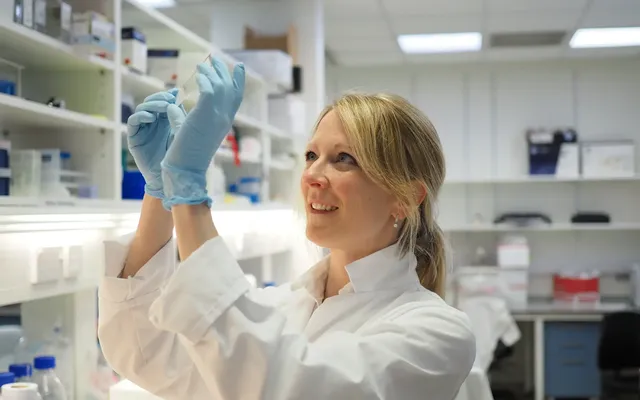Improving the lives of people with hearing loss
Dr Jack Holman is investigating the social and emotional aspects of daily life that are impacted by hearing loss.
Hearing loss is largely preventable or treatable, but it is becoming ever more prevalent due to both ageing populations and ongoing stigma – which prevents people from getting tested or wearing hearing aids.

Hearing is one of our most crucial senses for connecting with others. Loss of hearing can therefore severely impact wellbeing, affecting those suffering physically, socially, cognitively, and emotionally. As our populations age faster and the effects of modern life exacerbate the effects of poor hearing, there is an urgent need to address the growing problem of hearing loss in the UK.
Dr Jack Holman, Senior Research Fellow at the University of Nottingham, is investigating the social and emotional aspects of daily life that are impacted by hearing loss. He aims to help sufferers who require ongoing support by assessing the best ways for measuring their socio-emotional wellbeing. His research is helping to pave the way for effective interventions in the future.
How can hearing loss affect wellbeing?
“Good wellbeing isn't about being deliriously happy all the time; it's about being able to meet the challenges you face with the resources you have,” Jack explains.
“These challenges can be physical, social, or psychological. Hearing loss can impact all these areas.”
People with hearing loss often find themselves less connected to others, leading to greater chances of withdrawing from social situations. As well as this, sufferers can have a strong sense of internalised stigma, even if others don’t perceive them differently, adding to feelings of isolation and reduced social networks, and in turn, leading to more serious mental health issues like depression, anxiety and insomnia.
Good wellbeing isn't about being deliriously happy all the time; it's about being able to meet the challenges you face with the resources you have. These challenges can be physical, social, or psychological. Hearing loss can impact all these areas. Dr Jack Holman
Measuring ‘socio-emotional’ wellbeing
A key question Jack is seeking to answer is how to measure wellbeing in a reliable and consistent manner. “There are many known consequences of hearing loss to socio-emotional wellbeing, but we wanted more detailed information. So, we conducted a large study looking at the social networks and structures of people with hearing loss, comparing them to those without.”
Jack and his team assessed whether they could measure socio-emotional wellbeing with all the factors they believed to be relevant for people with hearing loss. The team used social network analysis and ecological momentary assessment (involving smartphone data logging), alongside questionnaires, to examine the most important factors affecting wellbeing.
“We identified three factors that stood out,” Jack says. The challenge facing the group was that no existing questionnaires covered these factors – highlighting a gap in knowledge. Jack is now working to address this gap by gathering more information about patients most at-risk and those most likely to not benefit from a hearing aid at all.
“The next step is to develop a reliable way of measuring these factors. Even when it eventually comes to developing interventions that target socio-emotional wellbeing, we don’t know the best way to monitor their effectiveness. By gaining a deeper understanding of what matters to people with hearing loss, we hope to help improve interventions in the future.”
Some employees may be reluctant to disclose their hearing difficulties.Dr Jack Holman
Hearing loss in the workplace
Jack is also addressing the lack of awareness in workplaces. “During my funded fellowship, I’ve been able to show that emotions tend to be worse in both formal and informal work situations if you have a greater hearing difficulty.
“Key organisations like the Royal National Institute for Deaf People (RNID) have done lots of work around this, including surveys of company management to understand what’s going on. They’ve found that employers’ knowledge of people with hearing loss is far lower than statistics indicate. This suggests that some employees may be reluctant to disclose their hearing difficulties.”
By collaborating with the RNID, Jack is hoping to uncover more about the issues facing people with hearing loss in the workplace, from stigma and a lack of control over office settings, to potential accommodations that could support employees.
Thanks to donors like Esme Gray, who supported my fellowship, I’m able to pursue research that can lead to meaningful change.Dr Jack Holman
Influencing clinical outcomes
“A primary goal of my research is to influence clinical practice and improve outcomes for people with hearing loss. I’ve been fortunate to be invited to speak at various places around the world, including for industry partners, hearing aid companies, universities, and professional audiology bodies. It's been incredibly rewarding to present my research directly to those who can implement it.”
“The Foundation’s support has helped me to branch out into new areas, expand my professional network, and feel more integrated within my own university. Thanks to donors like Esme Gray, who supported my fellowship, I’m able to pursue research that can lead to meaningful change.”
Donate now and change lives
Your support has led to ground-breaking discoveries and life-changing advances, but there is still more to do. For every researcher we support, there are many more we can’t – not because they lack merit, but because we lack the funds to support them all. You can change that. Your donation today could support research like Jack's, and could fund the next life-changing discovery.
Donate now